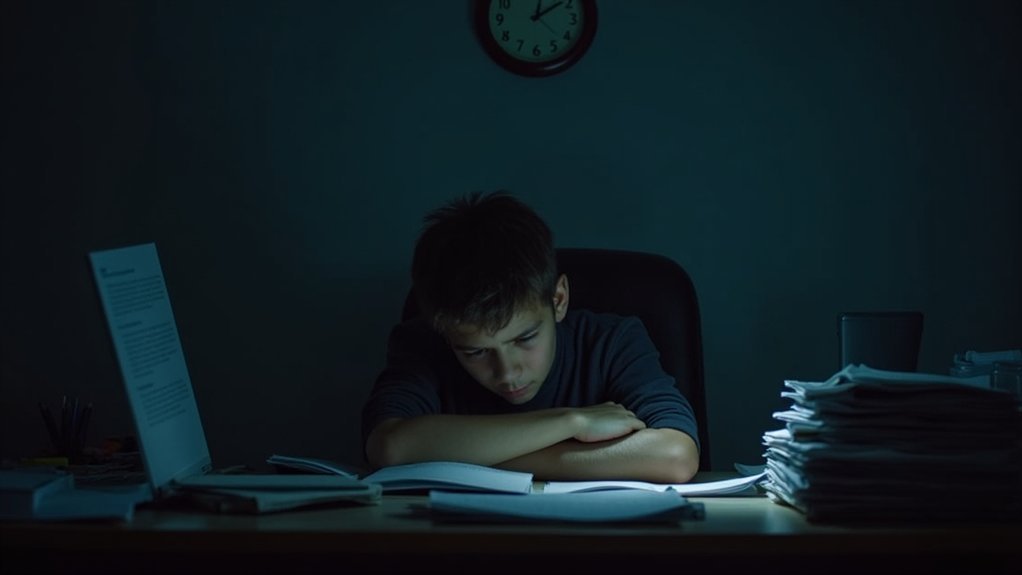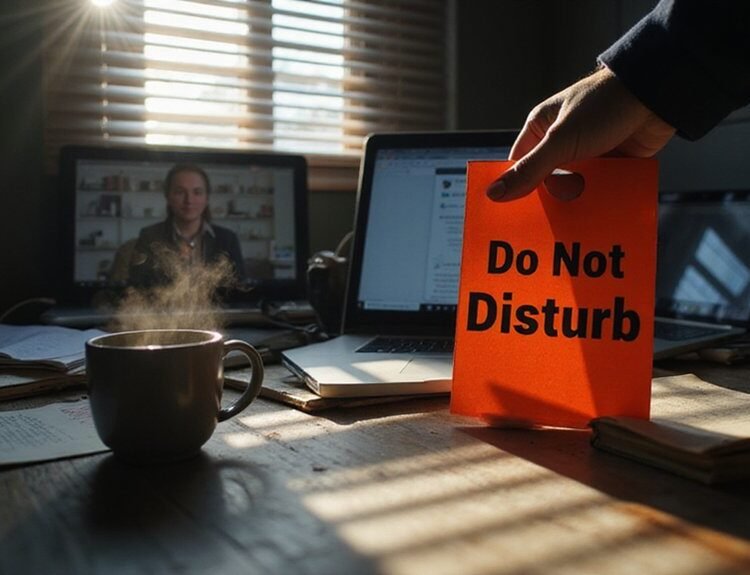Curiously, you might discover that your procrastination and anxiety often intersect at the most unexpected moments. When tasks pile up, you’re likely experiencing a complex psychological dance between fear and avoidance. Your brain’s natural defense mechanism triggers stress responses that paradoxically make completing work even more challenging. These patterns aren’t just personal quirks—they’re deeply rooted psychological phenomena that affect countless individuals. Want to understand how you can interrupt this cycle and reclaim your productivity? The next steps might surprise you.
Key Takeaways
- Recognize that procrastination is an emotional coping mechanism rooted in anxiety, and understanding this connection is the first step to breaking the destructive cycle.
- Implement structured task management techniques like the Pomodoro Method and breaking larger tasks into smaller, less intimidating steps to reduce overwhelming feelings.
- Practice mindfulness and self-compassion to reframe negative thoughts, build emotional resilience, and interrupt automatic anxiety-driven procrastination patterns.
- Develop accountability through support systems, such as partners or groups, to create external motivation and consistent progress toward personal and professional goals.
- Seek professional guidance through cognitive-behavioral therapy to identify specific anxiety triggers and learn personalized strategies for managing procrastination effectively.
Understanding the Anxiety-Procrastination Connection

While anxiety and procrastination might seem like separate challenges, they’re deeply interconnected psychological phenomena that can trap individuals in a destructive cycle of emotional avoidance. When anxiety triggers negative emotions about a task, you’re likely to postpone it, creating a self-reinforcing pattern that intensifies both psychological burdens. This mechanism stems from an instinctive desire to protect yourself from potential failure or perceived inadequacy. Research demonstrates that approximately 40 million adults experience anxiety disorders, highlighting how widespread this struggle is. Your brain fundamentally uses procrastination as a temporary coping mechanism, avoiding uncomfortable feelings by delaying task initiation. However, this strategy ultimately increases stress, generating more anxiety and perpetuating a harmful emotional loop that becomes increasingly difficult to interrupt.
Root Causes of Procrastination in Anxious Individuals

Because anxiety and procrastination are intimately linked, understanding their root causes becomes essential for breaking destructive behavioral patterns. When you’re anxious, procrastination emerges from complex psychological mechanisms that amplify negative thoughts and hinder mental health progress.
| Root Cause | Psychological Impact |
|---|---|
| Perfectionism | Task Paralysis |
| Fear of Failure | Emotional Avoidance |
| Emotional Dysregulation | Chronic Stress Cycle |
The desire to avoid uncomfortable emotions drives procrastination, creating a self-reinforcing cycle where task delay generates increased anxiety. Your perfectionist tendencies can transform simple tasks into insurmountable challenges, triggering a cascade of procrastination behaviors. Understanding these underlying mechanisms empowers you to recognize and interrupt destructive patterns, ultimately supporting healthier coping strategies and reducing the debilitating effects of anxiety-driven procrastination. Identifying procrastination triggers for perfectionists is essential in breaking this cycle. By becoming aware of the specific thoughts and situations that lead to avoidance, you can develop strategies to counteract them. Incorporating techniques such as setting realistic goals and practicing self-compassion can significantly mitigate these triggers, paving the way for more productive and fulfilling work habits.
Breaking the Cycle: Practical Strategies and Techniques

When anxiety and procrastination intertwine, breaking their destructive cycle requires strategic, targeted interventions that address both psychological and behavioral dimensions. You’ll need practical techniques to transform your approach to tasks:
- Implement the Two-Minute Rule, tackling small tasks immediately to build momentum
- Break larger tasks into manageable steps using structured planning
- Apply the Pomodoro Technique to create focused work intervals with intentional breaks
Building Resilience and Developing Healthier Habits

Although anxiety and procrastination can feel like an insurmountable challenge, building resilience offers a powerful pathway to breaking destructive cycles. By breaking tasks into smaller, manageable steps, you’ll develop self-compassion and reduce overwhelming emotions.
| Resilience Strategies | Emotional Benefits |
|---|---|
| Mindfulness Practice | Increased Self-Awareness |
| Task Segmentation | Reduced Anxiety |
| Self-Reflection | Emotional Regulation |
| Accountability Partners | Motivation Enhancement |
| Compassionate Self-Talk | Positive Self-Image |
Your journey involves cultivating healthier habits through emotional regulation and strategic approaches. Regular self-reflection helps identify procrastination triggers, while establishing a supportive network provides encouragement. By implementing these techniques, you’ll gradually break the cycle of anxiety-driven procrastination, transforming challenges into opportunities for personal growth and increased self-efficacy.
Mental Health Support and Professional Guidance

Steering through the complex landscape of procrastination and anxiety often requires professional mental health support to break persistent negative patterns. When you seek professional guidance, you’ll discover targeted strategies to address underlying emotional challenges:
- Cognitive-behavioral therapy techniques that help reframe anxious thought processes
- Personalized interventions designed to disrupt specific procrastination cycles
- Support groups that foster accountability and shared healing experiences
Mental health professionals can provide critical insights into your unique anxiety triggers, helping you develop resilience and healthier task management habits. By working with a therapist, you’ll learn to approach challenges with increased self-compassion, understanding the root causes of your procrastination. This professional support empowers you to transform anxiety from a barrier into an opportunity for personal growth and emotional well-being.
Frequently Asked Questions
Can Anxiety Cause You to Procrastinate?
Yes, anxiety can trigger procrastination patterns, as you’ll find your fear of failure and overwhelming stress often lead you to avoid tasks. By using mindfulness techniques, you’ll learn to manage these anxious impulses and break the avoidance cycle.
How to Stop Anxiety, Paralysis, Procrastination?
When anxiety’s chains bind you, break free by practicing mindfulness techniques, implementing smart time management, and embracing self-compassion strategies. Small, deliberate steps can transform paralysis into purposeful action, gradually reducing overwhelm and rebuilding your confidence.
Can You Break the Procrastination Cycle?
You can break the procrastination cycle by implementing motivation techniques, mastering time management, and developing self-discipline strategies. By understanding your emotional triggers and creating actionable plans, you’ll transform avoidance into purposeful, consistent progress.
What Is the Root of Procrastination?
Curiously, just as you’re pondering its origins, procrastination’s root lies in complex motivation factors: your fear of failure, poor time management, and emotional barriers that transform challenging tasks into seemingly insurmountable challenges.
Conclusion
Like a ship trapped in a storm, you’ve been steering through the turbulent waters of procrastination and anxiety. But remember, every wave can be transformed into forward momentum. By implementing targeted strategies and cultivating self-compassion, you’ll gradually rewire your mental patterns. Professional support and consistent practice are your compass, guiding you towards a more balanced, proactive approach to challenges. Your journey of overcoming anxiety isn’t about perfection, but persistent progress.



